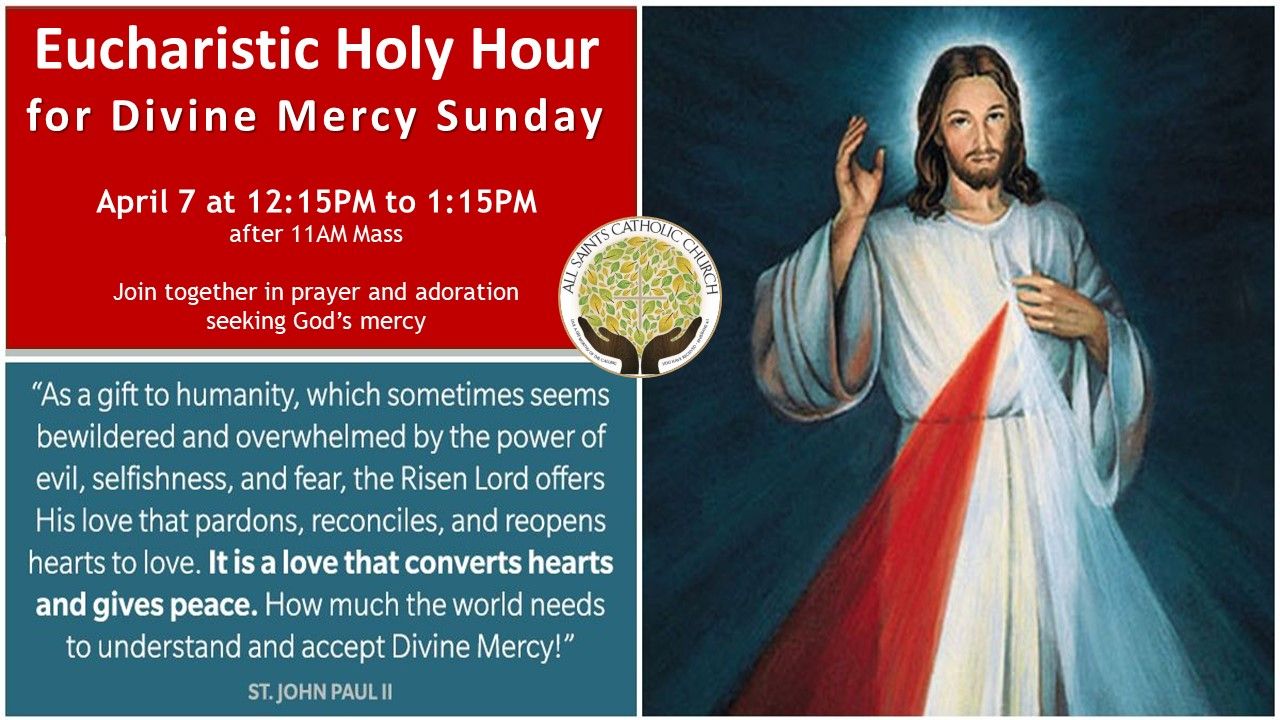Homily, Divine Mercy Sunday 2022
Second Sunday of Easter - Divine Mercy Sunday

Readings: Acts 4:32-3; 1 John 5:1-6; John 20:19-31
Every year on this second Sunday of Easter, the apostle Thomas takes center stage. We have come to know him as “doubting Thomas, a nickname that will forever define him — all, on the basis of one remark.
Did you ever wonder why Thomas was not with the others on that first Easter night? A group of women and men who had been disciples of the slain Jesus had gathered together in fear and confusion on the most mystifying evening of their lives. Did they lock the doors before Thomas arrived? Was he too sad or angry or ashamed to gather with them? Obviously, he wasn't completely cut off because soon thereafter somebody told him that Jesus had appeared in their midst.
This episode between the Risen Christ and Thomas in the upper room helps us to see what Easter faith is like. Thomas represents the transition we all have to make from looking for a visual experience of Christ with our eyes to experiencing the invisible, spiritual presence of Christ in sign and sacrament. Although we cannot see the Lord, He is here. He is with us in the sacraments of the Church, in the community of believers, and in the life of the Church. The Easter Candle here symbolizes His presence for us. Christ is not the candle of course, but it reminds us that He is among us. Even though we cannot see Him with our eyes, we can reach Him through faith. This is the beauty and majesty of our Easter faith.
The Gospel does not tell us if Thomas ever did put his hand in Jesus’ wound, but that doesn’t matter. Either way, he and the other Apostles received all Jesus had to give from his pierced heart: the gift of divine mercy that we celebrate today. At the end of the Easter Octave, we are called to reflect on how divine mercy sums up the whole mystery of Christ’s passion, death, and resurrection. Notice how Jesus immediately greets the Apostles on that first Easter with peace and shares his bountiful mercy – giving them his own power of forgiveness.
Jesus gave the disciples the Holy Spirit, so they be his agents of mercy in the Sacrament of Reconciliation. “Whose sins you forgive as forgiven them”. Thousands of years later, we continue to receive Christ’s mercy in confession.
When our Lord appeared to Sr Faustina Kowalska in the 1930s, he instructed her to paint what is now the famous image of himself with two rays coming from his heart, red and white for the blood and water that flowed from his side on the cross, with the inscription, “Jesus, I trust in you.” The water stands for the washing away of our sins in baptism and reconciliation, the blood for the new life that we receive in the Eucharist.
On this Sunday that immediately follows Easter the Church celebrates Divine Mercy Sunday, a feast based upon the private revelations of Jesus to St. Faustina. In extending this Feast to the entire Church, Pope John Paul II re-emphasized the resurrection context of Easter, citing St. Faustina’s diary: “Humanity will never find peace until it turns with trust to Divine Mercy” — Pope John Paul II, Divine Mercy Sunday Homily, April 22, 2001
Finally, I invite you to consider yourself in another role today- the role of an intentional disciple. Think about Jesus in this story and I want you to imagine yourself doing what Jesus did for Thomas? What exactly did he do? He helped someone believe who was having trouble doing so. He provided a kind of “evidence” to help him embrace things he was having trouble accepting. Put simply --- Jesus helped bring Thomas to faith, rather than push him away!
What evidence do we give as individuals and as a community? Does the way we live draw people toward a life of faith or make them indifferent to it? Does the way we live give others a clear picture of who we are, what we value most, what kind of world we’re trying to bring about and what defines us as a people?
Let us leave this place not thinking about how others are not reflecting the true spirit of the Gospel message. Rather, let us reflect on the ways each one of us fails to do what Jesus did for Thomas, the ways each of us fails to give others a reason to believe. People are searching and may we help them find what they are looking for. ###
Homilies











